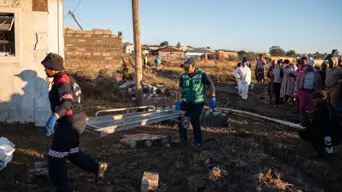EC floods: Some displaced Mthatha residents fear similar situation will happen in spring
Mongezi Koko
27 June 2025 | 10:34More than 4,700 people remain displaced and the death toll from the Eastern Cape floods stands at 101.

Forensic Pathology Services along with Emergency Medical Services (EMS) practitioners carry a stretcher after finding bodies in a dwelling near Mthatha on 12 June 2025. Picture: EMMANUEL CROSET/AFP
MTHATHA - Some displaced residents in flood-ravaged Mthatha said they’re worried about what will happen when the spring rains return, especially with aid slow to arrive and thousands still taking shelter in temporary spaces.
More than 4,700 people remain displaced and the death toll from the Eastern Cape floods stands at 101.
The youngest victim was just 12 months old.
ALSO READ:
- EC govt denies claims that flood survivors being told to return to unsafe homes
- EC flood survivors may need to wait up to 3 months to be housed
- EC govt recognises deficit of more than R800m to restore flood-damaged roads
The provincial government said land for relocation had been identified, but rehousing would take time due to planning, infrastructure, and administrative processes.
It said that it hopes to begin moving people within 30 days but admitted the full process could take up to three months.
At Sinolwazi Senior Secondary School in Decoligny, blackboards are still covered in chalk, but the classrooms are empty. Desks have been stacked up to make space for mattresses.
And in Joe Slovo, a small church is housing entire families.
Here, people said aid isn’t reaching them and they fear a repeat disaster when the September rains come.
"We fear that the September rains are imminent. What if a similar situation befalls us? Heavy rains are coming. We are in trouble. Our children will fall sick."
While there’s hope, many are still struggling with the trauma of the floods.
"We are afraid of this water. Even if there's blowing wind, you see, we just wake up thinking there's something coming."
As temperatures drop and storm season looms, many in Mthatha fear they may be forced to live through another flood before getting a new roof over their heads.
Get the whole picture 💡
Take a look at the topic timeline for all related articles.
Trending News
More in Local

27 January 2026 16:50
Tourism Dept projects electronic travel system can create up to 100k jobs

27 January 2026 15:41
Madlanga Commission: Senona denies assisting 'Cat' Matlala to secure R360m SAPS tender

27 January 2026 15:20
Kunene accuses Joburg mayor of ‘punching above his paygrade’ over Rea Vaya bus service suspension












